P R O L O G U E
If Beale Street could talk today, it would say we are living in extraordinary times. Times not so different from our past. Times in which the truth has sometimes become inconsequential for a taste of power. And you know what they say about the truth?
If you want to hide it, put it in a book.
In the age of screens, the importance of books is being swiped aside.
Television is arguably in its streaming heyday. Social media has become the drug of choice for those numbing whatever they need to numb. And books are sitting somberly in the background as if to say, "Hey, remember me?"
To learn to read — and then to learn to consume — books is one of a child's first artistic accomplishments. A whole new world opens. To ride in the back seat of the family car and draw a deeper meaning from those signs you've seen countless times before. To give an opinion because words are no longer a jumbled puzzle right in front of your eyes. To travel to different countries, different worlds, different galaxies without your feet touching the ground. These moments serve as an entryway to knowledge and understanding, empathy and education. Books are our first passports to the world.
The power of books resonates throughout history. They've been forbidden. They've been exalted. The holiday season itself revolves around a certain best-selling book and its protagonist.
On a bustling block in downtown Portland is Powell's Books — a rose that grew from concrete, a living shrine to books and their importance. Its aisles are trailways of curiosity. People walk them, scanning those colorful spines before plucking one (or two or five) off the shelf.
So what's it like to work at one of the country's largest independent bookstores in an era when everyone seems to be staring at a screen? OPB sat down with Jeremy Garber, events coordinator of Powell's Books, to talk about how vital books are, what it's like to speak to political players in front of a live audience and what books he'd choose if he had to reintroduce the entire world to reading.
In his 13-plus years at Powell's Books, Jeremy Garber has also been a cashier, a used-book buyer and a bookseller.
David Stuckey: My first question is a very simple one. Why is it so important to read books, now?
Jeremy Garber: I think we're living in really uncertain times right now. And I think, as always, it's important to have different perspectives of our own, to have access — even if just in print — to other ideas, other ways of being, different people's perspectives. I think fiction especially can help us empathize and understand people in ways that we otherwise may not have access to. Nonfiction is great because you can keep up on current events or specific subjects. But I just think, in general, reading takes you places. Like LeVar Burton said in "Reading Rainbow." It's quite literally just that. With books and reading, we're afforded perspectives that we otherwise may not ever have a chance to discover, let alone understand or embody or interpret in ways that enrich our own lives.
So I think it's important to read books all the time, but especially now and that's to say nothing of the precariousness that people are feeling right now, the uncertainty, the outright fear. And I think the act of reading itself can be comforting, can make you feel less alone or less alienated, whether it's reading somebody that looks like you or has a similar background or somebody who couldn't be more different than you. Like, you realize that, as human beings, we probably have a lot more in common than we first think and I think reading is a good bridge between people, between cultures.

Garber on the uptick in political works being published: "Recently, given the present political climate, there's no shortage of political books. And if I'm not mistaken, fiction sales nationwide in the industry are down a little, where as, nonfiction sales are sky high. And it's kind of counterintuitive because you'd think people would want to escape the daily news cycle and just disappear into a good novel. As the sales seem to indicate, we are finding the opposite."
David Stuckey / OPB
Stuckey: I feel like me and you, we read a lot. I like to call it "high-end" reading (meaning, reading is a lifestyle).
Garber: Those are your words. I've been accused of book snobbery on many occasions.
Stuckey: But that's the thing, it's not about that, really. It's about taking reading seriously. Does it matter if you're reading [Roberto] Bolaño or say crime fiction?
Garber: I think reading in and of itself, as an act, is important. And I think it can confer a lot of the advantages or opportunities that I just mentioned. I think there persists, in American culture at least, the idea that so-called literary fiction, or especially literature in translation, is somehow hard or difficult. And I think that's off-putting for a lot of people. I presume they get lost thinking stylistically it's not gonna be beginning, middle, end and things wrap up. So, I think that leads people to think, "Well, this book will be hard." It's not gonna be hard.
But I think it's good that anyone reads anything. I'd like to see more Americans reading. But I'd also like to see them challenge themselves to read outside of their comfort zone, whether it's an author of color, LGBTQ, someone from a country that speaks an entirely different language, whatever it is, I think that's important. So, I mean, read whatever you like to read. But also, step out of your comfort zone and your boundaries. I think growth, or learning, or the ability to see the world differently comes by challenging yourself and stepping out more. Plus, it's just ultimately rewarding. I think some of the best books in the world aren't being written in English right now.
Stuckey: I can't really describe a feeling like finishing a book. The satisfaction, the sense of accomplishment, especially if it's a book like say, speaking of Bolaño, something like "2666," where it's massive and takes a lot out of you mentally and physically. Can you articulate that feeling when you complete a book?
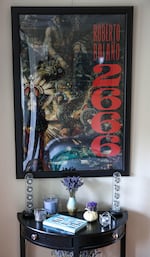
A poster of Roberto Bolaño's "2666" hangs in the apartment of Powell's Books' event coordinator Jeremy Garber.
David Stuckey / OPB
Garber: I can try. A lot of times, I think of movies in the same way. We are perhaps, first and foremost, storytelling creatures. It used to be oral storytelling before human beings learned to write and record. So I think we have a predisposition to want to understand stories and make sense of the world through stories.
And where books and movies, I think, differ, is that when you leave a movie, you're sort of immersed back into reality. You've suspended your disbelief for two hours. You sat in a darkened theater. You've seen the action or the drama on the screen. But somehow a book ... first of all, it usually takes you more than two hours to read a book. Something like "2666," could take many many days or even weeks. But you're fully immersed in a whole world. And even when you're not actively reading those pages, it's still gestating within you. You're still, at least somewhere in your subconscious, immersed in that realm even though you're cooking dinner or sitting at the desk at work.
So I think the satisfaction that comes is having, especially with fiction, lived a parallel life of your own, self-contained in a single book, but it has an advantage over movies that you feel like you've really immersed in ... just, if nothing else, by dint of how long it is.
So a book like "2666," coming out of it, you feel like you just stepped out of a whole new world that didn't exist to you here before, but yet somehow there's this satisfaction of having had the experience, having come out of the experience perhaps, if nothing else, entertained, but wiser, with a new perspective, a new way of seeing the world.
Stuckey: Let's switch gears and talk about Powell's. I feel that most people who visit Powell's come in contact with the booksellers. But you're the events coordinator. For a little behind-the-scenes, exactly what is your average day or week like?
Garber: The lion's share of my work is correspondence with publishers, publicists and authors. There's several ways we go about bringing an event to Portland, to Powell's. Oftentimes it's outreach from a publisher or an author. "Hey, I'm touring in support of my new book, are you interested in hosting me?" Sometimes it's an author that I see that would be a great fit for the community or there would be interest.
So I can reach out and say, "Hey, I saw you have this book, if you're going to be on the West Coast or in the Pacific Northwest, we'd love to welcome you to Powell's." So there's a lot of email, working back and forth, finding a suitable date that works on both ends, coordinating the details of the event. So I schedule for all the Powell's store events and the ticketed events which we do. It's all things events but it's always changing. We host over 500 events a year, so it keeps us quite busy.
Stuckey: You've had a lot of political players coming for events lately. Just quickly can you run through a couple who came, their books and what you took away from their talks?
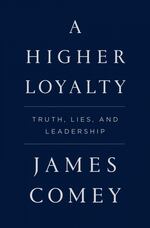
"A Higher Loyalty: Truth, Lies, And Leadership," by James Comey (304 pages).
Garber: One of the big things I was super excited for was former FBI Director James Comey. We hosted him back in the spring, and mere minutes before going on stage when we were discussing the audience Q&A, he asked if I would join him on stage and read the audience questions to him.
So for Comey, the thing I took away most was his character and his integrity. I had strong feelings about how the 2016 election went and the players involved, but after reading his book, "A Higher Loyalty," and then hearing his talk and hearing him respond to the audience's questions, I realized, yeah, first and foremost, this is a man who truly believes in his country, first and foremost.
It made me revisit some of my thoughts about how the run-up to the 2016 election played out and the results. But his character, his dignity and his integrity spoke volumes to me. I found after the event among both friends and family I had to sort of portray to them him in a different light. Based on what he said, based on what he wrote. Like, look, this is a fallible person who himself admits that if he had it to do all over again maybe he would have done it differently, not saying it would have been better or worse.
Shortly after him we hosted former Secretary of State Madeleine Albright. She has a new book, with the ominous title "Fascism: A Warning." I think she ties in her experiences as a youth in Europe and her time as secretary of state to just sort of draw parallels between what happened in Europe mid-century and what's going on now in this country.
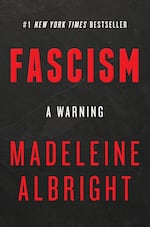
"Fascism: A Warning," by Madeleine Albright (302 pages).
So to see them in person, to be able to sit in the audience or even get a chance to ask them a question, you realize beyond the spin, beyond the media hype, behind the news bites and soundbites we see everyday, like, this is a person. And though I may not agree with them on a particular issue, you realize, these people really do take their charge seriously as public servants.
So to me it's neat to have access. And to provide access to the community to be able to interact with people like that, I mean Portland has some very strong opinions when it comes to politics. And we don't stop to think, well this is an individual, with their own unique background and perspectives on things and they're doing their best, hopefully, to represent the consensus of their constituents.
Stuckey: Now, another part of your job is to be in the business of books. Can you tell me about the festival you're attending in Mexico?
Garber: Yeah, I leave tomorrow to attend the Guadalajara International Book Fair. About a year ago a few publishers got to together and created a scholarship called Bookselling Without Borders, the idea was to connect American booksellers with other cultures and I believe the first year was the Frankfurt Book Fair in Germany. And this year they opened it up to three, so it's Frankfurt, Turin Book Fair and Guadalajara. And as someone long interested in Spanish-language fiction and poetry and drama, I applied to attend this one and I was accepted and awarded a scholarship to attend.
From what I've read, it's the second-largest book fair in the entire world and attracts 800,000 people a year. It's a wonderful opportunity and I think speaks to what we talked about, sort of broadening horizons, connecting people to a wider world of reading and books and publishing.
Stuckey: As high-end readers [laughs], we both love books from all over the world and part of Oregon Public Broadcasting's mission statement is "illuminating a wider world." For someone trying to get out of the American comfort zone, what makes a writer like Roberto Bolaño, which we have already discussed, so good?
Garber: Well, I came to translated literature ... I can remember so distinctly, there's a magazine I used to read. "Adbusters."
What was it? The Journal of the Mental Environment? I'm probably misquoting, but something like that, and a lot about culture and capitalism and art, politics even, and probably about ... this would have been 2002 or 2003, there was a letter to the editor.
It was just a few sentences long responding to a previous article, which I hadn't read, talking about, presumably, the death of literature, the death of the novel. And the person who had wrote in said something like, "There's plenty of great literature out there, you just need to read outside of American literature." And he mentioned three authors. And all three of them have more or less since become among my very favorites. José Saramago, the late Portuguese Nobel laureate; J.M. Coetzee, the South African Nobel laureate; and Italo Calvino, the Italian writer who should have also won the Nobel Prize.
And from there, it was just a veritable explosion, sort of the big bang of my adult reading life. And I realized, "Wow, these three authors, their books exposed me to something I didn't know you could do in fiction, I didn't know existed in the world of novels." So from there, I started reading a lot of Spanish and Portuguese fiction in translation. And I was right on the forefront, having been working at the bookstore at that time, of Bolaño and all the hype and long regard in the Spanish-language community as, "Hey, this guy is the real deal." So, I read, I believe "Amulet" was first. Then "The Savage Detectives" came out. Read that. And from then, I was just hooked. There's certainly a darkness to his writing, but it never seemed manufactured. It seemed to be an honest reflection of the world that he saw around him.
Even though he fancied himself a poet more than a novelist, I think most people know him as a novelist. But his books just seemed bold, courageous, unflinching, his prose is beautiful. In a lot of it, there's a sense of writerly adventure imbued in his works, which has always spoke to me too. A guy who never seemed scared to look at the margins of life, at what's existing on the peripheries of things.
And he seemed to have an unerring eye of what those environments look like. I mean, a book like "2666" is just, I mean, no words I can come up with. It's a blockbuster! He's just kind of the author, despite the mythical persona that's arisen since he's passed away, especially in English-speaking countries, he just seemed like a guy who was completely devoted to craft, devoted to exploring the possibilities of what fiction can do.
So, everything from his prose to the stories, the characters, to I guess the underlying ethos of who he is and why he was writing just captured me. And every time a new book of his, if they find anymore, comes out, I'm first in line.
Stuckey: Let's talk again about Powell's because I think it's such a thing in Portland. You're not just going to go to Powell's for five minutes. You might leave a credit card at home, etc. It's almost like a stay-cation spot in Portland, so can you tell us some things people that visit might not know about Powell's? For example, I know Powell's has a Vin Diesel Room.
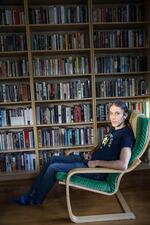
Garber at his home in front of his bookshelf. He owns an estimated 1,500 books.
David Stuckey / OPB
Garber: [laughs] Yes, the Vin Diesel room is a conference room in our warehouse. We also have a Chaka Khan conference room.
Stuckey: Nice.
Garber: Oh, let's see. I've worked a wedding at Powell's previously. So we've had people get married there. As far as I know, nobody's been born there yet, but it's long been regarded as the No. 1 first date spot in the city.
It used to be ... I'm not sure if it's a secret, but it used to be an old car dealership. If you're in the Blue Room and look up, there's a beam running the length of the ceiling that I believe says "auto parts" on it. So it's kinda neat.
Let's see, 68,000 square feet, obviously, a whole city block. My understanding is that we fluctuate around a million books on the shelves at a time.
And I would almost say that I hear more foreign languages being spoken within the walls of Powell's than I do walking any city street here. It's not like, say, like New York. If you walk down the street in New York, you hear all the languages. I don't think Portland has that kind of diversity. But everyone who comes to Portland tries to make a trip to Powell's.
So, you hear that. Let's see. That's a good question.
Stuckey: I'm a journalist.
Garber: Well, there's long been a legend that somebody's ashes may be interred inside the column on the 11th [Avenue] and Couch Street entrance to the building, the one that leads you into the Orange Room. I don't know for sure whether that tale is true, but I've heard it spoken of by both people that work there and people in the community.
There was a documentary film that, I believe it was a local filmmaker made about Powell's probably about a decade ago. And it was sort of a day in the life of Powell's. And you realize that it's not just a little neighborhood book store. It's become a cultural institution. You know, Walter, Michael and Emily Powell have built this bookstore into perhaps the most venerable bookselling institution in the country.
It's certainly one of the best in the world.
If you go down on a Saturday afternoon, especially near the holidays, it's got a whole different feel to it than it does on a quiet, drizzly Monday night in February, for example. So it's, in a lot of ways, like a living breathing organ.
I think that it can be an escape.
Obviously, it can be a place to find your next favorite book. But I think more than that, I think it just feels safe and homey to people. Any avid book reader or book lover can connect there. And one of my favorite things is to see two strangers strike up a conversation in an aisle, because they're both looking at the same author or the same display. And I think, in a lot of ways, it's a great equalizer.
It doesn't matter what you look like, how you identify, your background, any of those things. You sort of all check that at the door. And then, the breadth and wisdom and greatest works of art in the past thousands of years of human history are all available to everyone equally.
Stuckey: So what is the true importance or value of an independent bookstore?
Garber: Well, I think independent book stores are really important. I think increasingly people are realizing, not just with bookstores, but to have local independent businesses is really important for a community to thrive.
The dollars you spend shopping, say locally, you're helping to ensure the employment of people in the community. And independent book stores can do things that a chain book store, for example, cannot. Or it can curate books the way that an online retailer cannot. There's so much serendipity about walking into an independent book store, and not just Powell's. I think anywhere you go in the country, you see the same thing. That there is a bookseller and her favorite books tend to be literature in translation. Or you've got a bookseller and he only reads poets of color or whatever it is. That's how you discover the new titles.
Because we can launch things the way that an online retailer just can't do. I think one of the best things about independent book stores and booksellers is you're connecting with another human being as an individual.
To me, an algorithm can tell me, "Hey, you might like this book." And I may like this book. But I can't have a dialogue with that person. Whereas, if I go to my bookstore, and the local bookseller says to me, "Hey, I really think you're gonna like this book. I loved it. I remember what you read last time." That's a relationship you can't mimic, you can't get anywhere else.
And I think reading can sometimes be daunting for people. They know what they like, but you walk into a place like Powell's and it's 68,000 square feet, "I don't know what to read next. I know what I like." But you may not come from a readerly family, you may not read book reviews. So you're essentially relying on the guidance and advice and recommendations of a bookseller.
I mean, the United States has just some fantastic booksellers in all corners of the country. And I've had the fortune to meet several of them through work trips and such, but the breadth, the knowledge ... I mean, if you wanted to put people in office who are gonna be open-minded or things like that, booksellers would be a good place I'd start.
Stuckey: OK, last question. I'm a big fan of dystopian reads. I'm thinking books like "The Road," "Parable of the Sower," "The Plague," "Blindness." So my question is, imagine the apocalypse is happening outside this apartment, your apartment right now, and you have to pack up and leave. What five books would you choose in the next 60 seconds to reintroduce reading to the world in a dystopian future. Right now. Go! Remember, the apocalypse is happening outside your window, no time to think, just pick the five, now!
Garber: I gotta hurry. Oh jeez. That is a good question.
Stuckey: Forty seconds.
Garber: Whole world, jeez. There is no way I could have prepared for this question.
Stuckey: I told you it was going to be a hard question. You're dead by the way, but keep going.
Garber: I mean, I could pick five women authors, just women from Latin American-speaking countries, and that would be a great selection. And then tomorrow, it would be two Portuguese men. This is quite nearly impossible, with no heads up. OK. OK.
[minutes later]
So Marcus Aurelius' "Meditations." He's a stoic philosopher from the second century. And it's pretty much, I think, a guidebook to living. You realize it's been, what, over 1,800 years since this guy lived, but you realize people haven't changed at all, the same doubts, fears, hopes, dreams, worries, dramas, that have just played out for 2,000 years.
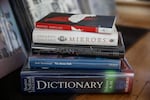
Jeremy Garber's five books to reintroduce the world to reading.
David Stuckey / OPB
Carl Sagan's "The Varieties of Scientific Experience: A Personal View of the Search for God." Long been a big Carl Sagan fan, but I think this book illuminates the human desire to want to understand what's beyond. Whether one has belief in a higher being, a creator, or just scientific explanation for curiosity sake. And it just sort of awakens just the innate human hunger for understanding the world around you.
Eduardo Galeano, a book called "Mirrors." He was a Uruguayan journalist. His most famous book is "Open Veins of Latin America" that Hugo Chavez famously gifted a copy to President Obama. So this book is sort of the short vignettes about everything in life, the history of the poor, the history of women, of religion, exploration, art.
José Saramago, "The Stone Raft." It is a book that begins with the idea that the Iberian Peninsula has broken off from the rest of Europe and is drifting out to sea. And a small group of people have to figure out what is happening and what to do.
Stuckey: And the dictionary, that's self-explanatory.
Garber: Yes, and the dictionary.
Stuckey: That's it! You did it. You just reintroduced the world to reading.
Garber: Jesus. That last question. Wow ... books.
Full book list of the OPB/Powell's Books Q&A
(by order of appearance)
"If Beale Street Could Talk" by James Baldwin
"A Taste Of Power" by Elaine Brown
"Rose That Grew From Concrete" by Tupac Shakur
“To Be Young, Gifted And Black” by Lorraine Hansberry
“2666” by Roberto Bolaño
“A Higher Loyalty: Truth, Lies, And Leadership” by James Comey
“Fascism: A Warning” by Madeleine Albright
"Amulet" by Roberto Bolaño
"The Savage Detectives" by Roberto Bolaño
“The Road” by Cormac McCarthy
“Parable Of The Sower” by Octavia E. Butler
“The Plague” by Albert Camus
“Blindness” by José Saramago
“Meditations” by Marcus Aurelius
“Mirrors” by Eduardo Galeano
“The Varieties of Scientific Experience” by Carl Sagan
“The Stone Raft” by José Saramago
“Oxford English Dictionary”
View more 10 Questions interviews: Mic Capes | Maya Vivas and Leila Haile

